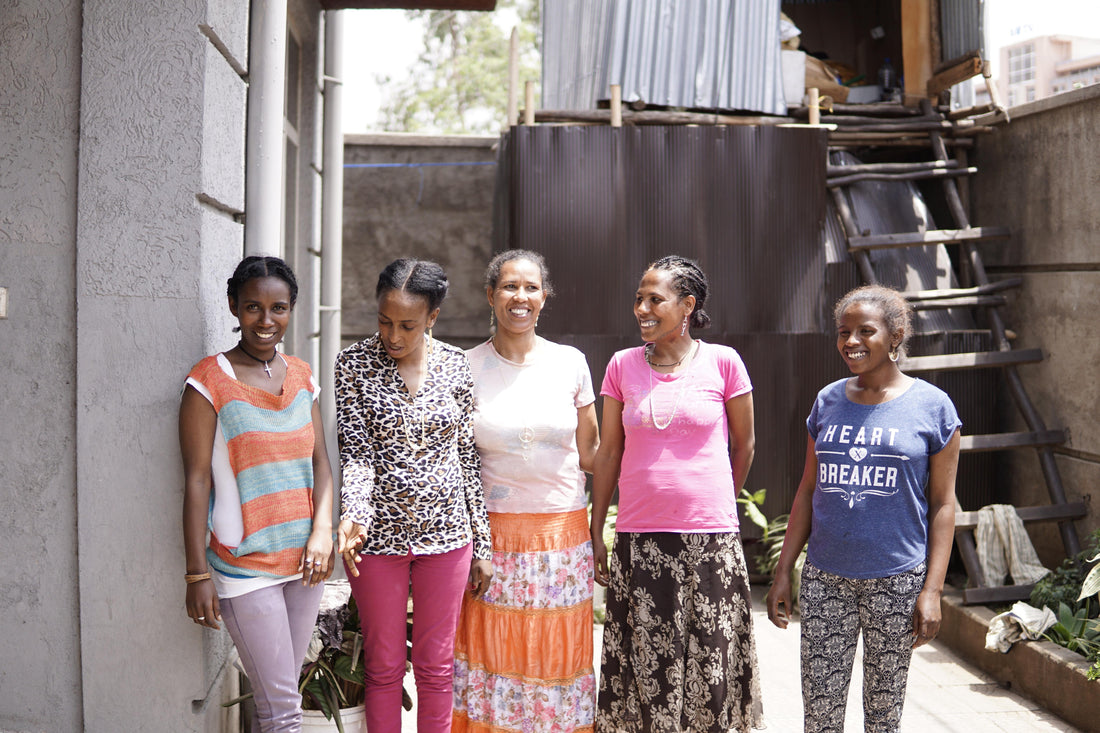Our team took a trip to Ethiopia in early June 2018 to visit our two artisan partners that make jewelry from recycled bullet casings. Our Operations Manager, Anna, reflects on this experience:
In the middle of a hot, congested, dusty city that reeks of diesel fumes, we visited two beacons of hope. Women who wouldn’t typically have the option to earn income can now support their families. They make beautiful jewelry from recycled bullet casings in Addis Ababa, the capital of Ethiopia. The shell casings come from the northern part of the country, and are left over from a border conflict that took place with Eritrea twenty years ago.
Finding the artisan workshops was no easy feat, as none of the buildings in Addis were labeled with a street number! In order for our taxi driver to find the workshops, we had to call our artisan partners for directions. Our driver would then navigate through endless roundabouts filled with cars and trucks loaded with plastic jugs and the occasional horse to get us to our destination. A few times, the driver got lost and pulled over to ask random people on the street for directions. Even though Joy had access to a map app on her phone and tried to help, the drivers would only listen to locals.
When we finally arrived, spending time in the workshops was like a breath of fresh air. The rooms were filled with natural light and long tables where the artisans spread out to work. The women welcomed us with big smiles. When anyone from outside their organization took an interest in their work, their faces lit up and big grins spread across their faces. They spoke Amharic and did not know more than a few words in English, but it was clear that they were proud of their work. While they loved to show off the jewelry, many of the artisans did not want pictures taken of anything more than their hands. They are working to overcome significant hardships and would rather be known for the quality of their work rather than the challenges they have faced.
These talented artisans are paid living wages. One of the workshop pays their artisans more than some salaries for government workers in Ethiopia. They start out in the primary class stringing beads and as they become more skilled they progress to the finishing class, where they do complicated work and design pieces. Before working with the artisan organizations, most of the women did not have bank accounts, but now they are able to regularly set aside money for the future.
We sat down with one artisan named Kademech, who has been part of one of the artisan organizations for over five years. She came to the group for assistance after learning about her positive HIV status, which is very stigmatized in her community. After her husband passed away, she became the sole caretaker of her five children. Kademech was a housewife with few opportunities to make money outside of the home, and is now a skilled jewelry maker whose favorite thing to make is necklaces. Every evening after work, she rushes home to cook dinner for her family. When asked about her hopes for the future, Kademech plans to help her kids and wants to see them succeed and thrive. She prays for her children every day.
During our visits, we had the opportunity to experience several coffee ceremonies. Every Friday after lunch the artisans make coffee. The coffee bean originated in Ethiopia and is regarded the best in the world. While we watched and munched on popcorn and barley seeds, the coffee maker roasted the beans over hot coals and a fragrant incense wafted over the entire room. Once cooked, the beans were steeped in hot water and the thick black coffee was then poured into a decorative coffee pot. Each of us received a tiny espresso cup of strong coffee. For every cup of coffee you drink during the ceremony, the more blessings you are to receive. It was an enormous privilege to share a cup of coffee with the talented women with whom we work. They were generous to share their stories and their time, and it is an experience I for one will never forget.
To support the talented artisans in Ethiopia, you can find examples of their work here.

